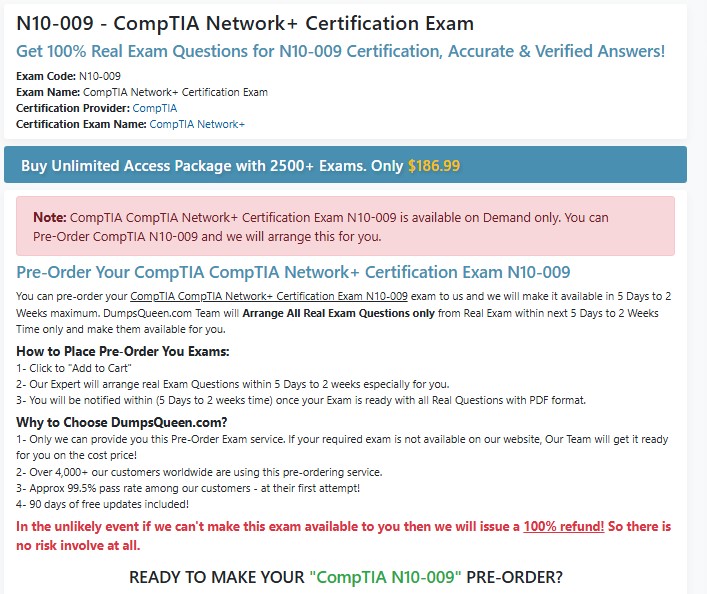Introduction
In today’s interconnected digital world, the Domain Name System (DNS) serves as a critical backbone of the internet, enabling seamless communication between devices and websites. For professionals, students, and IT enthusiasts preparing for certifications, understanding the functions of a DNS server is essential. At DumpsQueen, we provide comprehensive resources to help you master networking concepts like DNS for certifications such as CompTIA, Cisco, and AWS. This blog explores the intricate workings of DNS servers, their primary and secondary functions, and their importance in modern networking. By the end, you’ll have a clear understanding of how DNS servers operate and why they are indispensable. Let’s dive into the world of DNS and uncover its core functions.
Understanding the Basics of a DNS Server
A DNS server is a specialized computer system that translates human-readable domain names, such as www.dumpsqueen.com, into machine-readable IP addresses, like 192.0.2.1. This translation process, known as DNS resolution, is the cornerstone of internet navigation. Imagine trying to access a website by typing a string of numbers instead of a simple domain name—it would be cumbersome and error-prone. DNS servers eliminate this complexity by acting as an intermediary between users and the internet’s vast network of servers.
The Domain Name System operates as a distributed database, with DNS servers located worldwide, working together to ensure fast and reliable name resolution. When you enter a website’s URL into your browser, the DNS server processes your request, locates the corresponding IP address, and directs your device to the correct destination. This process happens in milliseconds, making DNS servers an invisible yet vital component of the online experience. At DumpsQueen, we emphasize the importance of understanding these foundational concepts for anyone pursuing networking certifications.
The Primary Function: Domain Name Resolution
The primary function of a DNS server is domain name resolution, which involves converting domain names into IP addresses. This process is akin to looking up a contact’s phone number in a phonebook. When you type a URL into your browser, your device sends a query to a DNS server, which then searches its database or communicates with other DNS servers to find the correct IP address. This resolution process occurs in two main forms: recursive and iterative queries.
In a recursive query, the DNS server takes full responsibility for resolving the request, contacting other servers as needed until it retrieves the IP address. In an iterative query, the server provides the best answer it has or refers the request to another DNS server. Recursive queries are common for end-user devices, while iterative queries are used between DNS servers to distribute the workload efficiently. The speed and accuracy of this resolution process are critical, as delays can lead to slow website loading times or failed connections.
DNS resolution also supports both IPv4 and IPv6 addresses, ensuring compatibility with modern and legacy systems. For IT professionals studying for certifications, understanding the nuances of recursive and iterative queries is crucial, and DumpsQueen study materials provide in-depth explanations to help you excel in these topics.
Caching for Improved Performance
Another critical function of a DNS server is caching, which significantly enhances performance and reduces network traffic. When a DNS server resolves a domain name, it stores the result in its cache for a specified period, known as the Time to Live (TTL). The next time a user requests the same domain, the server can retrieve the IP address from its cache instead of querying other servers, resulting in faster response times.
Caching is particularly beneficial for popular websites, such as www.dumpsqueen.com, which receive frequent traffic. By storing commonly requested domain-to-IP mappings, DNS servers reduce the load on the global DNS infrastructure and improve the user experience. However, caching must be carefully managed, as outdated records can lead to incorrect resolutions. The TTL value, set by the domain’s administrator, determines how long a record remains in the cache before it expires and requires a fresh query.
For certification candidates, understanding caching mechanisms is essential, as questions about TTL and cache management often appear on exams. DumpsQueen practice tests and study guides cover these topics in detail, helping you prepare effectively.
Load Balancing and Traffic Distribution
DNS servers also play a vital role in load balancing and traffic distribution, ensuring that websites and online services remain accessible even under heavy demand. Large websites, such as e-commerce platforms or streaming services, often use multiple servers to handle user traffic. DNS servers can distribute requests across these servers by providing different IP addresses for the same domain name, a technique known as round-robin DNS.
For example, when you visit www.dumpsqueen.com, the DNS server might direct your request to one of several servers based on factors like geographic location, server load, or availability. This ensures that no single server becomes overwhelmed, improving performance and reliability. Advanced DNS configurations, such as Global Server Load Balancing (GSLB), take this a step further by directing users to the closest or least congested server, optimizing the user experience.
Load balancing is a key topic in certifications like Cisco’s CCNA and AWS’s Solutions Architect, and DumpsQueen resources provide detailed insights into how DNS contributes to scalable network architectures.
Security Functions of DNS Servers
In addition to performance and accessibility, DNS servers play a critical role in network security. One of the most important security functions is supporting DNS Security Extensions (DNSSEC), which authenticate DNS responses to prevent attacks like cache poisoning. Cache poisoning occurs when malicious actors insert false DNS records into a server’s cache, redirecting users to fraudulent websites. DNSSEC uses digital signatures to verify the authenticity of DNS data, ensuring that users connect to legitimate servers.
DNS servers also support security by enabling features like blocklists and filtering. Organizations can configure DNS servers to block access to malicious or inappropriate websites, protecting users from phishing, malware, and other threats. For example, a company might use a DNS server to restrict access to non-work-related sites, enhancing productivity and security.
For IT professionals, understanding DNS security is crucial, especially for certifications like CompTIA Security+ and CISSP. DumpsQueen study materials include detailed sections on DNSSEC and other security features, helping you master these complex topics.
Supporting Email and Other Services
DNS servers are not limited to web browsing; they also support a variety of internet services, including email. Email systems rely on DNS records, such as MX (Mail Exchange) records, to route messages to the correct mail servers. When you send an email to [email protected], the DNS server uses the MX record to identify the recipient’s mail server and ensure proper delivery.
Beyond email, DNS servers support other services through specialized records, such as TXT records for Sender Policy Framework (SPF) authentication, which helps prevent email spoofing. They also enable services like Voice over IP (VoIP) and content delivery networks (CDNs) by providing the necessary routing information. This versatility makes DNS servers a cornerstone of modern internet infrastructure.
For certification candidates, understanding the role of DNS in email and other services is essential, as these topics frequently appear on exams. DumpsQueen comprehensive resources cover these applications in depth, ensuring you’re well-prepared.
Managing DNS Records and Zones
DNS servers are responsible for managing DNS records and zones, which are critical for defining how domain names are resolved and services are accessed. A DNS zone is a portion of the DNS namespace managed by a specific organization or administrator. For example, the dumpsqueen.com zone contains all records related to that domain, such as A (address), CNAME (canonical name), and MX records.
Managing these records requires precision, as errors can lead to website downtime or misrouted services. DNS servers use zone files to store this information and synchronize it across multiple servers to ensure consistency. Primary DNS servers hold the authoritative records, while secondary servers replicate these records for redundancy and fault tolerance.
For IT professionals, understanding zone management is a key skill, particularly for certifications like Microsoft’s Azure Administrator or AWS’s SysOps Administrator. DumpsQueen study guides provide practical examples and scenarios to help you master DNS record management.
High Availability and Redundancy
To ensure uninterrupted service, DNS servers are designed for high availability and redundancy. The DNS system uses a hierarchical structure, with root servers, top-level domain (TLD) servers, and authoritative servers working together to resolve queries. If one server fails, others can take over, preventing disruptions.
Organizations often deploy multiple DNS servers in different geographic locations to enhance reliability. For example, DumpsQueen might use primary and secondary DNS servers hosted in separate data centers to ensure that www.dumpsqueen.com remains accessible even during outages. Techniques like anycast routing further improve availability by directing users to the nearest operational server.
Conclusion
DNS servers are the unsung heroes of the internet, performing critical functions that enable seamless browsing, secure communications, and reliable service delivery. From domain name resolution and caching to load balancing, security, and support for email and other services, DNS servers are indispensable in modern networking. For IT professionals and certification candidates, mastering these functions is essential for success in exams and real-world applications.
At DumpsQueen, we are committed to helping you achieve your certification goals with high-quality study materials, practice tests, and expert guidance. Whether you’re preparing for CompTIA, Cisco, AWS, or other certifications, our resources cover DNS and other networking topics in depth. Visit www.dumpsqueen.com to explore our offerings and take the next step in your IT career. With a solid understanding of DNS server functions, you’ll be well-equipped to navigate the complexities of networking and excel in your professional journey.
Free Sample Questions
Question 1: What is the primary function of a DNS server?
A) Encrypting network traffic
B) Translating domain names to IP addresses
C) Hosting web content
D) Managing email servers
Answer: B) Translating domain names to IP addresses
Question 2: What is the purpose of DNS caching?
A) To increase email delivery speed
B) To store IP addresses for faster resolution
C) To authenticate DNS responses
D) To balance server loads
Answer: B) To store IP addresses for faster resolution
Question 3: Which DNS record is used to route email to the correct server?
A) A record
B) CNAME record
C) MX record
D) TXT record
Answer: C) MX record
Question 4: What does DNSSEC provide for DNS servers?
A) Load balancing
B) Authentication of DNS responses
C) Website hosting
D) Email routing
Answer: B) Authentication of DNS responses



